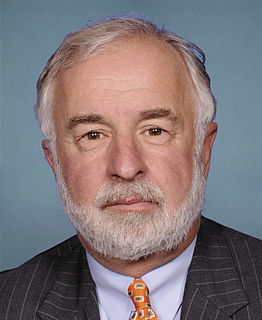A Quote by Chrystia Freeland
Individual nations have offered their own contributions to income inequality - financial deregulation and upper-bracket tax cuts in the United States; insider privatization in Russia; rent-seeking in regulated industries in India and Mexico.
Related Quotes
During the 1990s the United States sought to impose the 'Washington Consensus' on Latin American governments. It embodied what Latin Americans call 'neo-liberal' principles: budget cuts, privatization, deregulation of business, and incentives for foreign companies. This campaign sparked bitter resistance and ultimately collapsed.
Let's take the nine states that have no income tax and compare them with the nine states with the highest income tax rates in the nation. If you look at the economic metrics over the last decade for both groups, the zero-income-tax-rate states outperform the highest-income-tax-rate states by a fairly sizable amount.
There are 11 states in the United States that in the last 50 years instituted an income tax. So I looked at each of those 11 states over the last 50 years, and I took their current economic metrics and their metrics for the five years before they put in the progressive income tax... Every single state that introduced a progressive income tax has declined as an overall share of the U.S. economy.
If you want to see where Trump is moving, look at what the United States neoliberals advised Russia to do after 1991, when they promised to create an ideal economy. Russia was under the impression that the neoliberal advisors were going to make Russia as rich as the United States. What they really did was create a kleptocracy that was virtually tax-free.
If you look at the performance of the zero-income-tax-rate states and the highest-income-tax-rate states, I believe a large amount of their difference is due to taxes. Not only is it true of the last decade, but I took these numbers back 50 years. And, there's not one year in the last 50 where the zero-income-tax-rate states have not outperformed the highest-income-tax-rate states.
In those countries where income taxes are lower than in the United States, the ability to defer the payment of U.S. tax by retaining income in the subsidiary companies provides a tax advantage for companies operating through overseas subsidiaries that is not available to companies operating solely in the United States. Many American investors properly made use of this deferral in the conduct of their foreign investment.
Indeed the three policy pillars of the neoliberal age-privatization of the public sphere, deregulation of the corporate sector, and the lowering of income and corporate taxes, paid for with cuts to public spending-are each incompatible with many of the actions we must take to bring our emissions to safe levels.
Our federal income tax law defines the tax y to be paid in terms of the income x; it does so in a clumsy enough way by pasting several linear functions together, each valid in another interval or bracket of income. An archeologist who, five thousand years from now, shall unearth some of our income tax returns together with relics of engineering works and mathematical books, will probably date them a couple of centuries earlier, certainly before Galileo and Vieta.
I was an advocate of the deregulation movement and I made - along with a lot of other smart people - a fundamental mistake, which is that deregulation works fine in industries which do not pervade the economy. The financial industry undergirded the entire economy and if it is made riskier by deregulation and collapses in widespread bankruptcies as what happened in 2008, the entire economy freezes because it runs on credit.
But you'll notice, you will notice that Russia and China, invariably at the United Nations, move to block American action, to repress or hem in or punish other kinds of outlaw. Who stands behind Mugabi at the United Nations? Russia and China do. Who tried successfully to prevent the United Nations from speaking with one voice on its most signal violation of its resolutions, Iraq? Russia and China, again. North Korea the same. Burma the same.

































